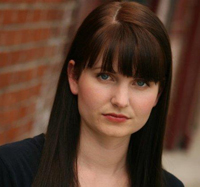By Eva Trieger


SAN DIEGO — While she might have said, “Not tonight, Adam. I have a headache,” instead Lilith said, “No!” and ever since then women have had hell to pay. This Jewish myth of Adam’s first wife captivated Callie Prendiville, author of Blamed, as it illustrated that a strong woman, seeing herself as Adam’s equal, refused to submit to her man’s demands. She was cast out of the Garden and ever after, viewed as a demoness, wreaking chaos. This legacy caused Prendiville to stitch together a multicultural tapestry of tales illustrating the oft repeated theme of a young girl causing trouble for her people.
Blamed was submitted to the San Diego International Fringe Festival, self-described as “11 Days of Eyeball Busting Shows.” The festival was begun in Edinburgh, but now has homes in several cities spanning the globe. According to the website its goal is to “provide an opportunity for artists to showcase their works and performances in a setting unconstrained by censorship, judgment, or the status quo.” To this end, the variety of shows runs the gamut: comedy, drama, burlesque, physical art, puppetry, dance, cabaret, and experimental. You get the picture; anything goes, and I mean anything. To ramp up the excitement this year, the film festival has gone south of the border, and will include performances in Tijuana. The 2015 Fringe Festival will run from July 23rd to August 2nd.
Non-profit organization, Contact Arts, teams up with Actors Alliance of San Diego and gains corporate sponsorship which is channeled directly back to the arts programs to encourage creative endeavors. This created a platform for Prendiville’s Emerging Fringe play to be produced. This facet is the darling of the festival because it selects plays that feature youthful, aspiring talent. Actors are performing arts students from La Habra Theater Guild, between grades 7-12.
Prendiville is an assistant adjunct professor at USD’s theater department. She wrote a television documentary called How Booze Built America which focused on alcohol, economics and prohibition. Another television series, Weather of Not was shot in studio at Cal State as a low budget project for Prendiville’s Masters of Fine Arts program. As a voice coach, writer, actress, teacher and historian, Prendiville told me that she loves the way theater provokes discussion and invites viewers to re-examine culture. The hallmark of a great show, said Prendiville, “is that when you leave the theater and continue talking, debating and asking questions, your opinion keeps changing.”
This deeper analysis is the impetus behind Blamed, written by Prendiville and choreographed by Annie Lavin. The show is produced by Prendiville’s husband, Brian Johnson, and performed by La Habra High School students. The music for the play was written by Wesley Chavez. The collaborative process proved exciting, and challenging, Prendiville explained, partially because of the time constraints on the school aged actors.
Prendiville shared that she is fascinated by history and how women’s roles have changed and how they have not changed enough. Her play reveals the way that the retelling from an historic perspective may shed new light on victim shaming, the darker side of blaming a young girl for becoming a rape victim on a college campus, i.e. her attire was provocative, she was asking for it.
The play’s author reported that this negative perspective appears in many cultures and to prove this she highlighted Marie Antoinette, Jean D’Arc, Little Red Riding Hood, Eve, and Pandora. Prendiville spoke of La Llorona. The Weeping Woman, in Mexico and South America and La Malinche, a woman sold to Cortez, and deemed a traitor. She is said to kidnap Spanish children and is seen as a boogeyman to keep youngsters in line. In seven stories that relate the lives of these woman, some fictional, some real, audiences will begin to see that women have been marginalized throughout history and around the globe. Some of the stories are told through folk/fairy tales, some through choreography and dance to “physicalize what’s happening.” Others are set to the music of two guitars and a fiddle.
Prendiville spoke passionately about her concern that people consume media views without exploration and accept these world views that engender sexual violence, or tolerate inequality as status quo. When asked what she hoped audiences would take away from Blamed, the play’s author stated, “I want people to question the deeper message of our story telling, to reconsider their assumptions.” Prendiville doesn’t want us to indoctrinate our youth and perpetuate the negative myths that are at the base of bedtime stories and fairy tales, but to objectively evaluate the messages these convey to the next generation.
Quintessentially, Prendiville’s goal is to debunk the myth that dominant women should be feared and obliterate this pall that that permeates strong women. In short, Prendiville wants to redeem Lilith and return her to the Garden of Eden, without the negative stigma associated with her self-assertion, but rather as a positive role model for young women, encouraging them to push beyond cultural limitations and achieve their potential.
Blamed tickets are available online at sdfringe.ticketleap.com/blamed-an-established–fiction/
The price per ticket is $10, passes are available for the entire 11 day festival and there is a one-time Fringe Tag requirement that cost $5. One hundred percent of the revenues go to the artists.